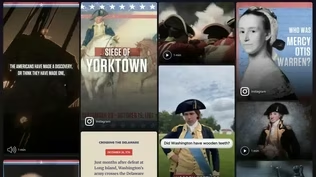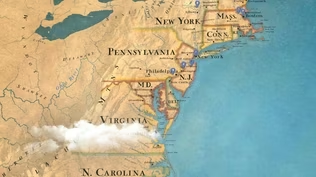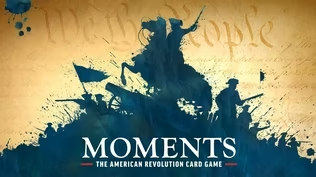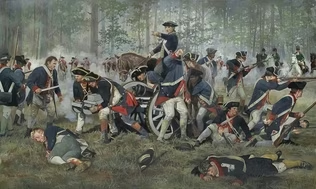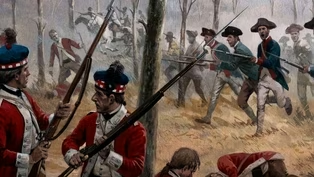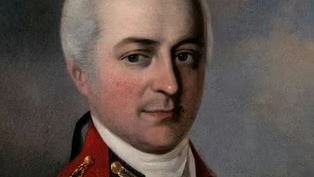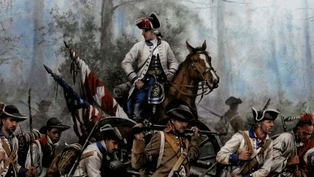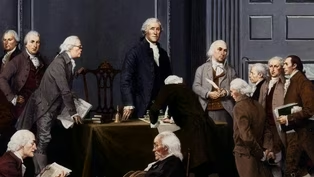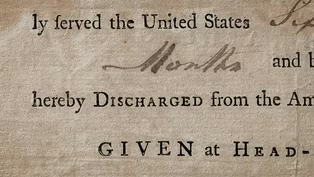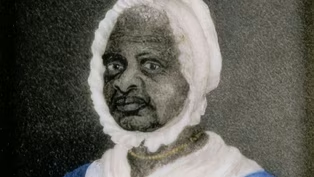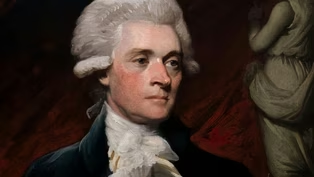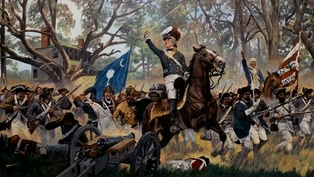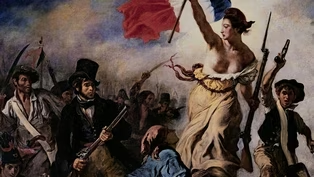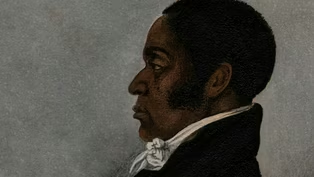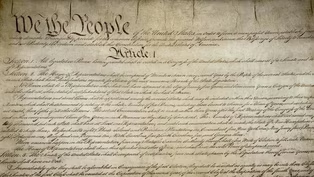
The Battle of Yorktown & The End of the American Revolution
Clip: Episode 6 | 10m 44sVideo has Closed Captions
Outnumbered and surrounded, General Charles Cornwallis surrenders, ending the American Revolution.
Washington deceives the British into thinking he's moving north while his troops and the French navy move to surround General Charles Cornwallis at Yorktown. The maneuver works, and the British are trapped. The combined American and French armies siege Yorktown, forcing Cornwallis to surrender. The Battle of Yorktown is over and the world will never be the same.
Problems playing video? | Closed Captioning Feedback
Problems playing video? | Closed Captioning Feedback
Episodes presented in 4K UHD on supported devices. Corporate funding for THE AMERICAN REVOLUTION was provided by Bank of America. Major funding was provided by The Better Angels Society and...

The Battle of Yorktown & The End of the American Revolution
Clip: Episode 6 | 10m 44sVideo has Closed Captions
Washington deceives the British into thinking he's moving north while his troops and the French navy move to surround General Charles Cornwallis at Yorktown. The maneuver works, and the British are trapped. The combined American and French armies siege Yorktown, forcing Cornwallis to surrender. The Battle of Yorktown is over and the world will never be the same.
Problems playing video? | Closed Captioning Feedback
How to Watch The American Revolution
The American Revolution is available to stream on pbs.org and the free PBS App, available on iPhone, Apple TV, Android TV, Android smartphones, Amazon Fire TV, Amazon Fire Tablet, Roku, Samsung Smart TV, and Vizio.
Buy Now
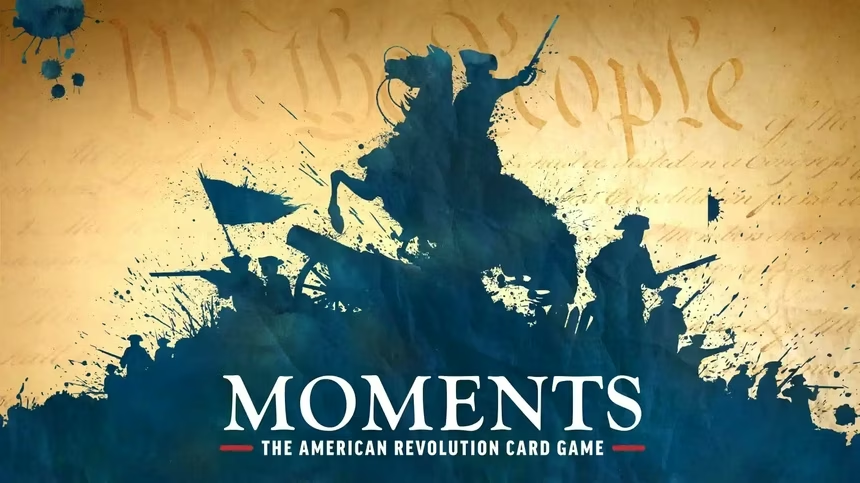
MOMENTS: The Revolutionary War Card Game
Use your knowledge of Revolutionary-era moments to build a timeline of real historical events.Providing Support for PBS.org
Learn Moreabout PBS online sponsorship♪ Narrator: On September 28, 1781, at 5 A.M., the French and American armies, now 18,000 strong, started toward Yorktown.
The allies established a crescent-shaped encampment around the town-- the French on the left, the Americans on the right.
Washington and Rochambeau set up headquarters just a few hundred yards apart.
♪ The two commanders rode forward to reconnoiter.
Washington had long understood Yorktown's strategic limitations and the hole the British had dug for themselves.
♪ 800 to 1,000 yards from Yorktown stood an outer line of trenches and redoubts, their bases bristling with abatis, sharpened logs meant to repel invaders.
♪ Black laborers could be seen struggling to complete an inner ring around the town.
♪ Swamps and marshy creeks made a direct assault impractical.
The allies didn't have time to starve the defenders, either.
The French fleet was due to return to the Caribbean within weeks.
A traditional, European-style siege seemed to be the answer.
Washington left its planning to the French.
The Americans were "totally ignorant of the operations of a siege," Rochambeau said.
He had taken part in 14 of them.
♪ At dawn on September 30, French and American troops edged cautiously toward the outermost British defenses, expecting stiff resistance.
Instead, they found them empty.
Cornwallis, outnumbered 3 to 1, had pulled his men back into town.
Lengel: Cornwallis makes a fatal mistake.
He's exhausted.
He's depressed.
A commander who otherwise is very effective is just not at his best.
Narrator: For 5 days and nights, allied soldiers worked to transform the abandoned British positions into their own strongholds and to bring up the artillery, equipment, and entrenching tools needed to dig their first parallel trench and begin the siege.
♪ British artillery hurled shot and shells at the Americans and Frenchmen as they worked.
[Men shouting] Sarah Osborn, the wife of a New Jersey corporal, was one of the women who carried beef, bread, and hot coffee to the men as they dug.
One day, she remembered, George Washington happened by and asked her if she wasn't afraid of the British cannonballs.
"No," she said, "It would not do for the men to fight and starve, too."
[Distant explosion] When the parallel was complete, it stretched for more than a mile, a trench 10 feet wide and nearly 4 feet deep.
♪ At 3:00 in the afternoon on October 9, the French opened fire.
Two hours later, Washington was given the honor of touching off the first American cannon.
[Man shouting] Narrator: All along the allied lines, cannon and mortars began firing into Yorktown.
♪ Voice: The remainder of the night passed in a dreadful slaughter.
Several parts of the garrison were in flames on this night, and the whole discovered a view awful and tremendous.
Bartholomew James.
Voice: It was as if one witnessed the shock of an earthquake.
3,600 shot by the enemy were counted in this 24 hours.
These were fired at the city into our lines and against the ships in the harbor.
Private Johann Conrad Doehla.
♪ Narrator: By the night of October 11, the allies had begun digging a second parallel, but before the noose could be tightened completely, two enemy redoubts, Numbers Nine and Ten, had to be taken.
The American target was redoubt Number Ten.
The men were from Lafayette's force.
Alexander Hamilton was in command.
Joseph Plumb Martin and his company led the way.
♪ Voice: We advanced beyond the trenches and lay down on the ground to await the signal.
Our watchword was "Rochambeau," a good watchword, for being pronounced "Rochambeau," it sounded, when pronounced quick, like "Rush on, boys."
[Martin] [Cannon fires] Narrator: When the signal was given, Martin and his fellow soldiers rushed forward.
Right behind them came Rhode Islanders, including free Black men or former slaves.
♪ The moment they reached the abatis, the redoubt's defenders began firing down into them.
♪ Voice: But there was no stopping us.
I forced a passage at a place where I saw our shot had cut away some of the abatis.
While passing, a man at my side received a ball in his head and fell under my feet, crying out bitterly.
The fort was taken and all quiet in a short time.
[Martin] ♪ Narrator: Lafayette sent a dispatch to a French officer in the column assigned to capture Redoubt Number 9, saying his men were in his redoubt.
"Where are you?"
"Tell the Marquis I am not in mine," the French officer replied, "but will be in 5 minutes."
[Cannon fires] Voice: There was no mercy that night.
Complaints and groans could be heard everywhere.
Someone called out here, another there, begging to be killed for the love of God, as the redoubt was strewn with the dead and wounded, so much so that we had to walk on them.
Georg Daniel Flohr.
Narrator: The allies lost no time in rolling their big guns into both redoubts and opening fire on Yorktown.
Friederike Baer: It was absolutely horrific.
There was no moment to rest.
There was no place to hide.
For days, there was continuous bombardment.
[Shells whooshing] ♪ Narrator: Cornwallis knew his cause was hopeless, but he could not seem to bear what Banastre Tarleton called "the mortification of a surrender."
♪ [Snare drum playing] At about 10:00 in the morning on October 17, 1781, a drummer appeared on a British parapet, beating his drum, the signal that Cornwallis wished to negotiate.
When the thunder of the guns drowned out the drumming, an officer climbed up next to the soldier and waved a white handkerchief.
Voice: He might have beat away till doomsday if he had not been sighted by men on the front lines, but when the firing ceased, I thought I had never heard a drum equal to it, the most delightful music to us all.
Ebenezer Denny.
[Snare drum continues] Narrator: The Battle of Yorktown was over.
The Patriots and their French allies had won.
♪ The world would never be the same.
♪ Surrender negotiations went on for a day and a half.
Cornwallis wanted his British and German soldiers free to sail home.
Washington refused.
He recalled the disrespectful way Patriot General Benjamin Lincoln and his men had been treated after the fall of Charleston.
Until a formal peace was reached, the surrendering soldiers were to remain in the United States as prisoners of war.
Cornwallis had little choice but to agree.
♪ As the British and Germans marched out of what was left of Yorktown-- their flags cased, their numbers reduced by wounds and disease-- they had orders to avoid even looking at the victorious Americans.
Only the French, they'd been told, were worthy opponents.
Washington and Rochambeau waited on horseback.
Lord Cornwallis was nowhere to be seen.
He claimed to be ill, but, as a professional soldier, he may simply have been too humiliated at having to surrender his army to a group of rebels to make an appearance.
Cornwallis' second in command, General Charles O'Hara, stood in for him and tried to surrender his sword to General Rochambeau.
Rochambeau refused to accept it.
"We are subordinate to the Americans," he said.
"General Washington will give you orders."
Washington wouldn't accept it, either.
He passed O'Hara on to his second in command, Benjamin Lincoln, who formally accepted the sword and then handed it back, as custom dictated.
♪ Conway: The ultimate humiliation-- not only having to surrender to the Americans, but having to surrender to the second in command of the Americans.
♪ Voice: With what soldiers in the world could one do what was done by these men?
One can perceive what an enthusiasm which these poor fellows call liberty can do.
Who would have thought a hundred years ago that out of this multitude of rabble would arise a people who could defy kings?
Johann Ewald.
Video has Closed Captions
Clip: Ep6 | 6m 41s | Daniel Morgan leads the British into a trap, securing a crucial victory for the Patriots. (6m 41s)
Benedict Arnold Turns Traitor and Defects to the British
Video has Closed Captions
Clip: Ep6 | 6m 4s | George Washington discovers that Benedict Arnold has abandoned his post and defected to the British. (6m 4s)
Bernardo de Gálvez & His Big Ambitions
Video has Closed Captions
Clip: Ep6 | 3m 20s | When Spain enters the war, the governor of Spanish Louisiana sees his chance to retake West Florida. (3m 20s)
The Constitution & The Formation of A More Perfect Union
Video has Closed Captions
Clip: Ep6 | 7m 17s | The American Revolution is over, and delegates convene to create a new system of government. (7m 17s)
Video has Closed Captions
Clip: Ep6 | 2m 9s | The Continental Army was made up of ordinary Americans, like Joseph Plumb Martin. (2m 9s)
Elizabeth Freeman Successfully Sues for Her Freedom
Video has Closed Captions
Clip: Ep6 | 1m 46s | Mumbet, later known as Elizabeth Freeman, would help bring an end to slavery in Massachusetts. (1m 46s)
Video has Closed Captions
Clip: Ep6 | 3m 8s | The American Revolution is not just the start of a nation, but an event that will change the world. (3m 8s)
General Nathanael Greene in the South
Video has Closed Captions
Clip: Ep6 | 2m 38s | London’s Southern strategy falls apart as Nathanael Greene takes British outposts one after another. (2m 38s)
George Washington Stops a Mutiny
Video has Closed Captions
Clip: Ep6 | 3m 1s | George Washington takes action when an unsigned manifesto starts circulating among his officers. (3m 1s)
James Forten Becomes a Privateer
Video has Closed Captions
Clip: Ep6 | 2m 36s | James Forten was 14 when he signed onto a privateer to fight for his country. (2m 36s)
Preview: The Most Sacred Thing
Video has Closed Captions
Preview: Ep6 | 30s | Victory at Yorktown secures independence. Americans aspire for a more perfect union. (30s)
Providing Support for PBS.org
Learn Moreabout PBS online sponsorshipSupport for PBS provided by:
Episodes presented in 4K UHD on supported devices. Corporate funding for THE AMERICAN REVOLUTION was provided by Bank of America. Major funding was provided by The Better Angels Society and...

